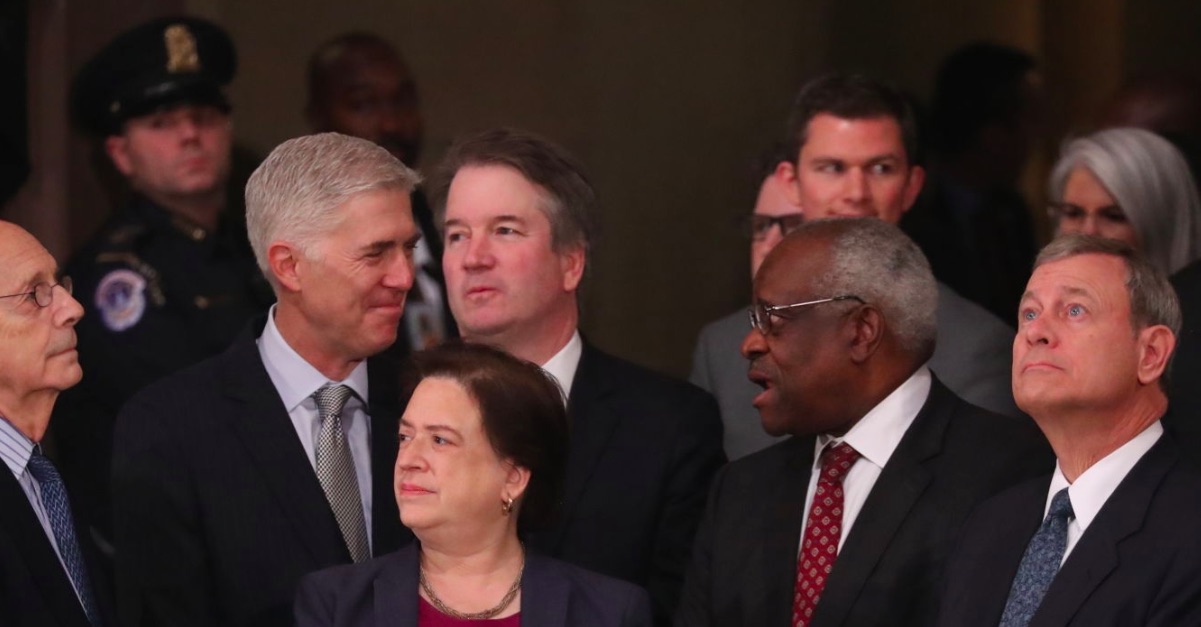
President Donald Trump‘s two appointees to the Supreme Court of the United States are far from clones of one another. Justices Neil Gorsuch and Brett Kavanaugh displayed their differences in rather stark fashion on Monday.
Gorsuch sided with liberal justices in a 5-4 decision in U.S. v. Davis et al., writing “In our constitutional order, a vague law is no law at all.” Kavanaugh, on the other hand, opined that the Court “usually reads statutes with a presumption of rationality and a presumption of constitutionality.”
The context:
Respondents Maurice Davis and Andre Glover were charged with mul tiple counts of Hobbs Act robbery and one count of conspiracy to commit Hobbs Act robbery. They were also charged under 18 U. S. C. §924(c), which authorizes heightened criminal penalties for using, carrying, or possessing a firearm in connection with any federal “crime of violence or drug trafficking crime.” §924(c)(1)(A). “Crime of violence” is defined in two subparts: the elements clause, §924(c)(3)(A), and the residual clause, §924(c)(3)(B). The residual clause in turn defines a “crime of violence” as a felony “that by its nature, involves a substantial risk that physical force against the person or property of another may be used in the course of committing the offense.” Ibid. A jury convicted the men on most of the underly- ing charges and on two separate §924(c) charges for brandishing a firearm in connection with their crimes. The Fifth Circuit initially rejected their argument that §924(c)’s residual clause is unconstitutionally vague, but on remand in light of Sessions v. Dimaya, 584 U. S. ___, the court reversed course and held §924(c)(3)(B) unconstitutional. It then held that Mr. Davis’s and Mr. Glover’s convictions on the §924(c) count charging robbery as the predicate crime of violence could be sustained under the elements clause, but that the other count—which charged conspiracy as a predicate crime of violence—could not be upheld because it depended on the residual clause.
Gorsuch, who wrote the opinion for the majority, concluded that 18 U. S. C. §924(c)(3)(B)–a law enhancing punishment for those using a gun while committing a “crime of violence”–is “unconstitutionally vague.”
“Even the government admits that this language, read in the way nearly everyone (including the government) has long understood it, provides no reliable way to determine which offenses qualify as crimes of violence and thus is unconstitutionally vague,” Gorsuch wrote.
Kavanaugh did not see it that way.
“A statute is unconstitutionally vague only if ‘it fails to give ordinary people fair notice of the conduct it punishes,’ or is ‘so standardless that it invites arbitrary enforcement,'” he wrote. “Section 924(c)(3)(B) is not unconstitutionally vague. To reiterate, §924(c)(3)(B) defines ‘crime of violence’ as ‘an offense that is a felony and … that by its nature, involves a substantial risk that physical force against the person or property of another may be used in the course of committing the offense.'”
“This case therefore should be straightforward. But the Court complicates things by engaging in a two-step dance that ends with the Court concluding that §924(c)(3)(B) is unconstitutionally vague,” he added.
As some have noted, this is a pretty good snapshot of the differences between Trump’s SCOTUS appointees.
Also of note:
Former federal prosecutor John Marti, a partner at international law firm Dorsey & Whitney, told Law&Crime that today’s decision will likely result in a “tidal wave of habeas petitions and appeals” by others who have been convicted under the “crime of violence” statute.
“Today the Supreme Court eliminated this powerful tool for federal prosecutors in combating violent crime, by finding that the statute is unconstitutionally vague by using the phrase ‘crime of violence.’ This holding is not surprising, considering the Court’s prior holdings involving statutes increasing punishment when involving violent crime,” Marti said. “Johnson v. United States, a case from the District of Minnesota, invalidated similar language in a different as unconstitutionally vague.”
“Of the 66,873 cases reported in Fiscal Year 2017, over 2,000 involved convictions under 18 USC 924(c). About half of those were convicted for using or carrying guns while drug trafficking. The remaining defendants were likely convicted under the crime of violence prong,” Marti continued. “The Courts will experience a tidal wave of habeas petitions and appeals for those defendants, and thousands of other defendants in prior years convicted under the crime of violence clause of 924(c).”
Editor’s note: this story was updated after publication with additional comment from John Marti.
[Image via Jonathan Ernst/Pool/Getty Images]